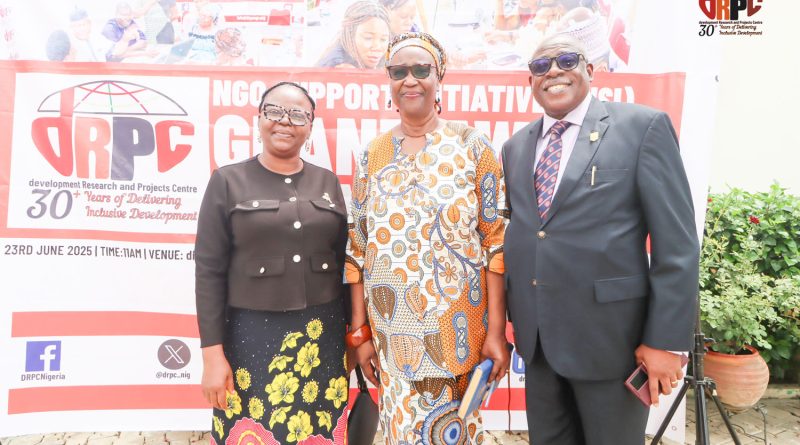Initiative empowers Nigerian NGOs affected by USAID funding cuts
The development Research and Projects Centre (dRPC) has taken a bold step to fortify Nigeria’s civil society landscape and guarantee the sustainability of local development actors by launching the NGO Support Initiative, a mentorship-driven capacity-building program aimed at empowering 17 Nigerian NGOs impacted by recent disruptions in USAID funding.
The new intervention demonstrates the dRPC’s commitment to protecting Nigeria’s NGO sector from the impact of foreign funding withdrawals, particularly those that promote social inclusion, women’s rights, and good governance.
Over N150 million was granted to local Nigerian nonprofits working in local communities, changing the lives of thousands of vulnerable groups, women, and children under the NSI project, according to Judith-Ann Walker, executive director of the dRPC, who stressed during the launch that the programme is a strategic investment in local resilience rather than just a band-aid solution.
“Local organisations are frequently the ones who suffer the most when development partners withdraw or stop funding,” Ms Walker stated. In addition to providing short-term assistance, this programme equips our partners with the resources, guidance, and strategic ability necessary to attract new donors and become self-sufficient.
A Lifeline through Education and Mentoring
For 17 subgrantee NGOs who have previously operated under USAID-supported programmes, the dRPC NGO Support Initiative focuses on mentorship, proposal preparation, institutional building, and donor engagement training.
Each subgrantee is matched with an experienced development practitioner from dRPC’s network for a structured six-month mentorship programme. To prepare NGOs for competitive donor funding environments, these mentors assist them with strategic planning, financial management, communications, and monitoring and evaluation (M&E).

To ensure that participating organisations can meet the rigorous criteria demanded by significant funding agencies, the programme also provides donor mapping sessions, compliance readiness tests, and practical proposal writing clinics.
Creating a Sustainable Future for Neighbourhood Nonprofits
The project reflects a broader transition away from reliance and toward sustainability in Nigeria’s development environment.
A new generation of locally led, internationally recognised civil society organisations is being produced by dRPC by giving local NGOs the tools they need to plan, oversee, and assess programs independently.
“Donors like to collaborate with local partners who are open, responsible, and technically proficient,” stated Stanley Ukpai, director of projects at dRPC. “We want to make sure that no promising NGO is overlooked because they are unable to interact with or maintain international partners.”
Through community-of-practice meetings, the programme also fosters peer learning among subgrantees, enabling NGOs from all over Nigeria to exchange experiences, form partnerships, and jointly develop plans for next collaborative actions.
Restoring Local Impact and Donor Confidence
Early participant feedback already demonstrates a renewed sense of confidence.
According to Grace Ibrahim, executive director of a women-led NGO in Borno State, the mentorship has improved her organisation’s accountability procedures and proposal-writing approach.

“We thought it was finished when our USAID funding stopped,” she added. “We were able to restore our confidence and processes thanks to the dRPC coaching. We are now preparing our first independent proposal and negotiating with two new contributors.
A call for Action to Partners and Donors
Localisation has emerged as a key component of development cooperation, and the dRPC’s NGO Support Initiative coincides with a change in global funding priorities.
To ensure that local NGOs remain sustainable, open, and significant players in Nigeria’s development landscape, dRPC is extending an open invitation to international donors, foundations, and development agencies to collaborate in scaling up the model that has not only provides continuous support to communities in need, but has strengthened the capacities of the 17 NGOs in fiduciary, programme management, donor relations, and other skills needed to ensure an accountable, and transparent donor funds management.
READ ALSO: NMA panel asks judge for more time to submit report on Nnamdi Kanu’s health status
In addition, Ms Walker stated, “We see this as a bridge, not just between past and future finance, but between dependency and self-reliance. We hope that these NGOs will go on to implement projects and even provide funding to others in the future.”
The dRPC NGO Support Initiative, which combines local leadership, capacity building, and mentoring, offers a viable template for rebuilding Nigeria’s civil society infrastructure from the ground up, transforming today’s challenges into opportunities for collaboration and progress in the future.
Hassan Aliyu Karofi is the Director of Communication and Partnership at the dRPC and can be contacted on [email protected]


